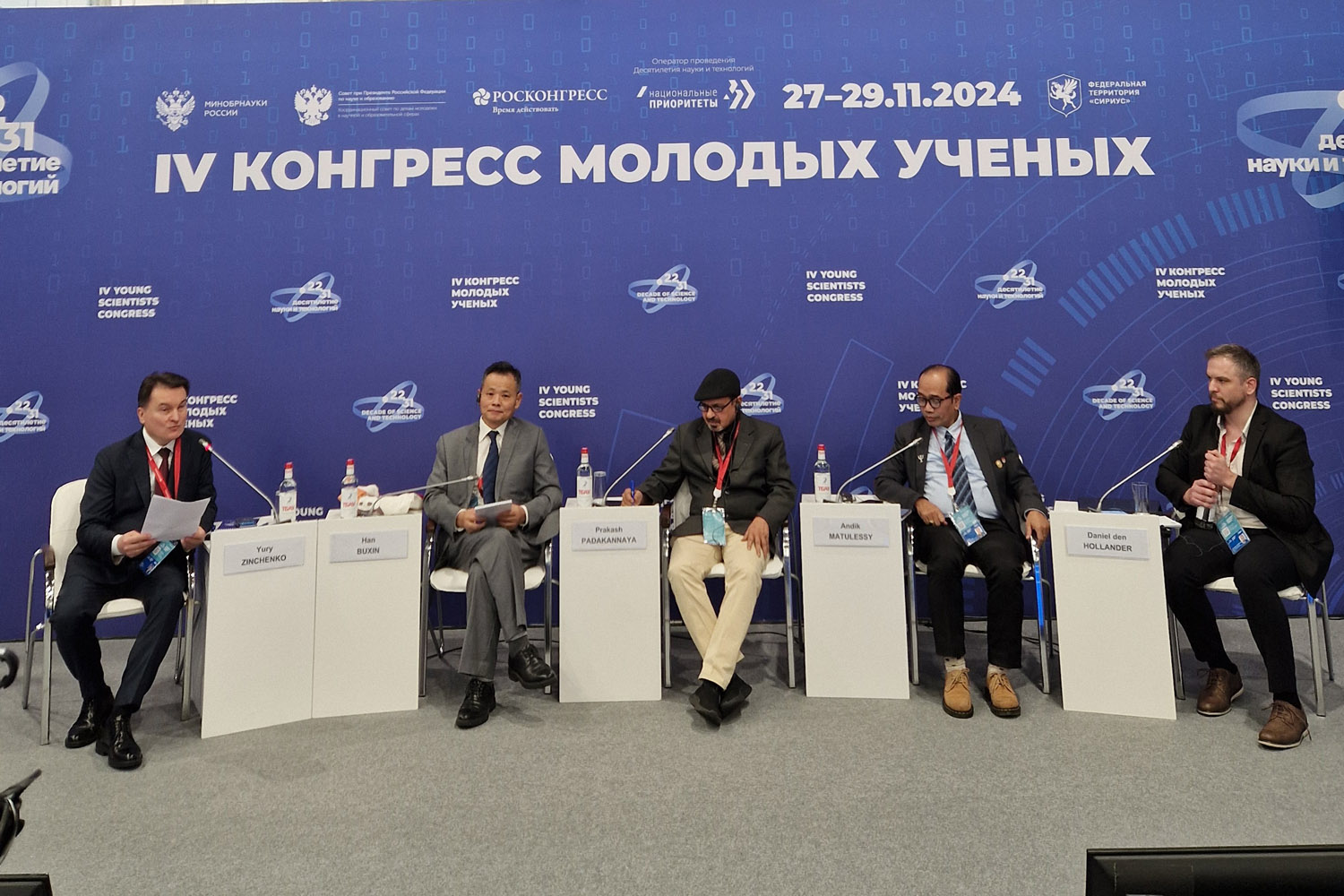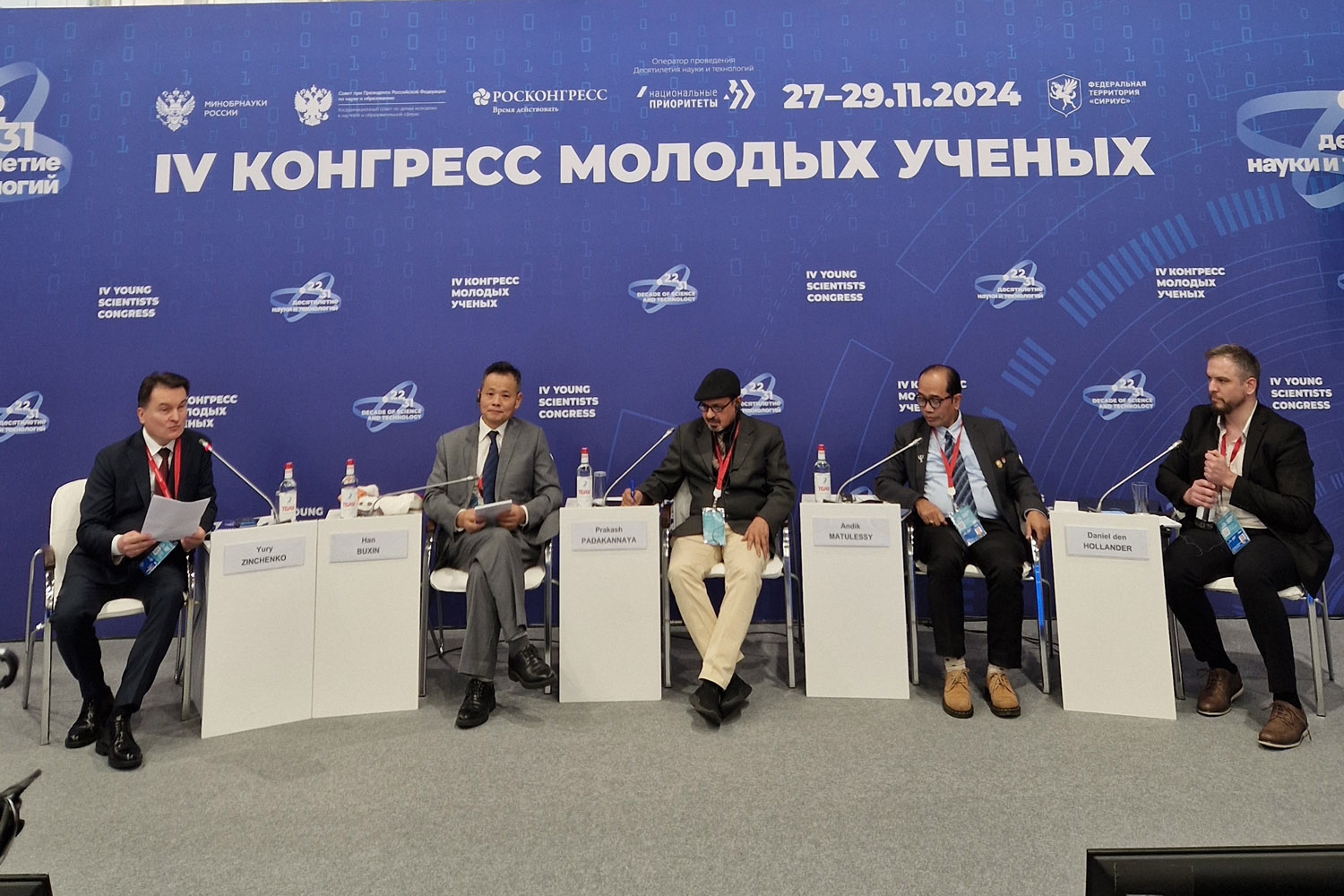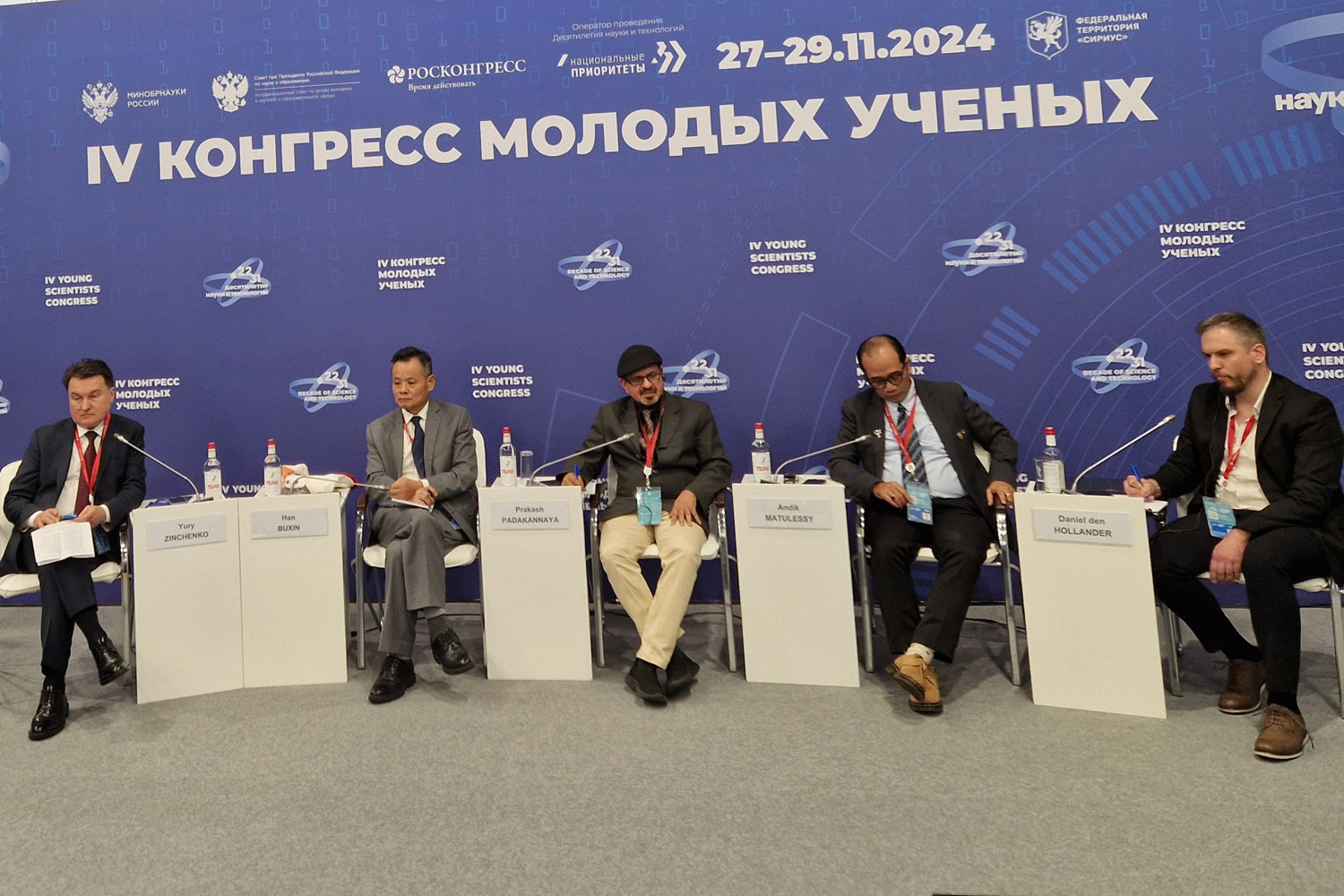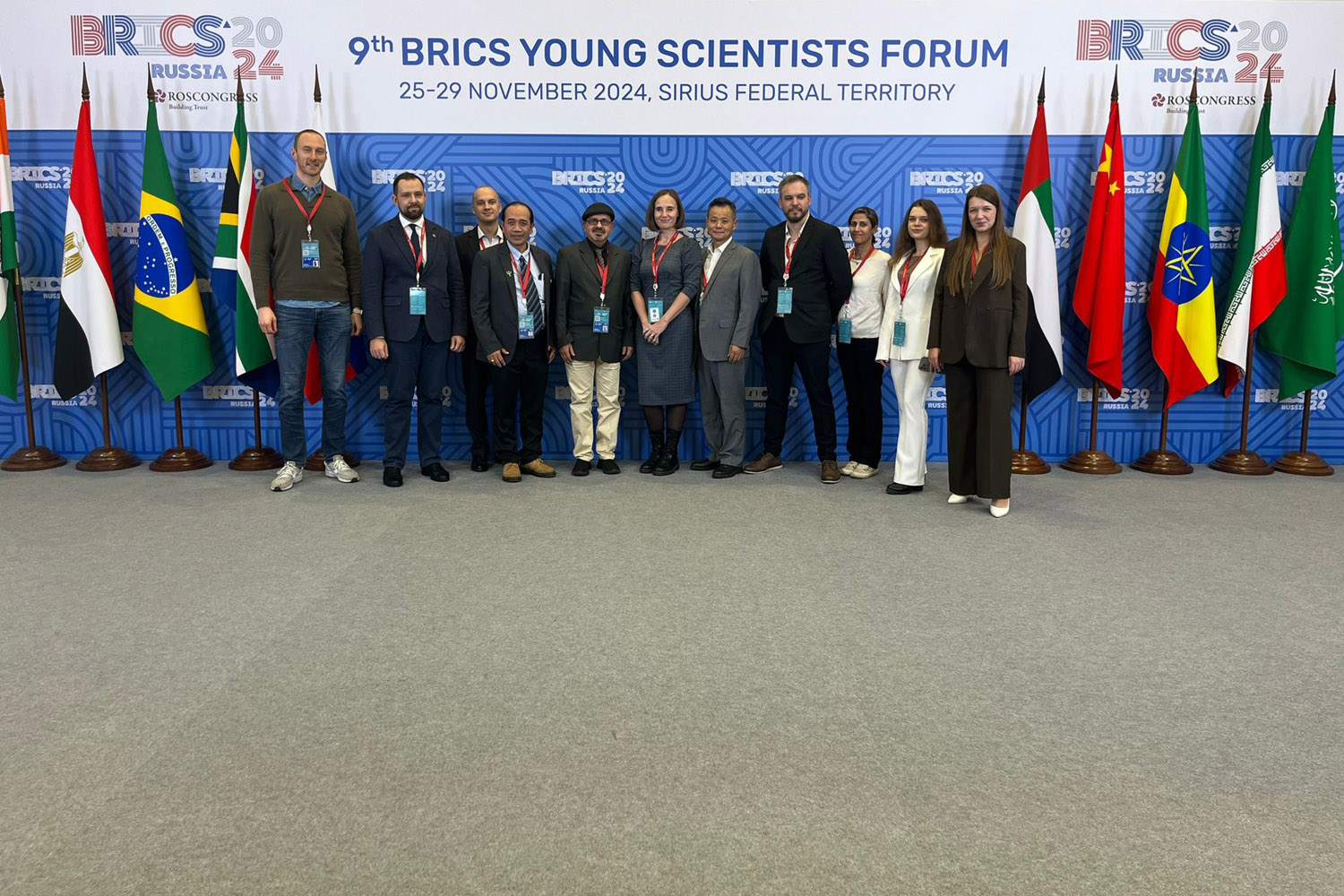09.12.2024
On November 27, 2024, the 'BRICS Cooperation in Psychology: Contributing to Society's Well-Being' panel was held as part of the Young Scientists Congress (Sirius, Russian Federation). The panel was chaired by Yuri P. Zinchenko, President of the Russian Psychological Society, Member of the Council for the Implementation of State Policy in the Sphere of Protecting Family and Children, Member of the Public Council of the Ministry of Education and Science of the Russian Federation, Dean of the Faculty of Psychology at Lomonosov Moscow State University, Director of the Federal State Funded Research Institution for Psychological and Interdisciplinary Research, Member of the Russian Academy of Education, Professor.
The panelists were:
- Saths Cooper, Professor and President at the Pan-African Psychology Union, former President of the International Union of Psychological Science at UNESCO, Political and Public Activist (Republic of South Africa);
- Daniel den Hollander, Executive Committee Member of the Psychological Society of South Africa (PsySSA) (South Africa);
- Han Buxin, Professor at the Institute of Psychology of Chinese Academy of Sciences; President of the Asian Psychological Association (People's Republic of China);
- Jorge Enrique Torralbas Osle, Professor at the Faculty of Psychology of the University of Havana; President of the Cuban Society of Psychology (Republic of Cuba);
- Andik Matulessy, President of Indonesian Psychological Association (HIMPSI); Treasurer at the ASEAN Regional Union of Psychological Societies (Republic of Indonesia);
- Prakash Padakannaya, Professor at the School of Psychological Sciences of the Christ University; Member of the Executing Committee of the International Union of Psychological Science at UNESCO; Treasurer at the Asia Pacific Psychological Alliance in Bengalulu (Republic of India);
- Henok Hailu, Professor at the Addis Ababa University, President of the Ethiopian Psychologists Association (Federal Democratic Republic of Ethiopia).
Yuri P. Zinchenko launched the panel in his opening speech, where he highlighted the key aspects of international cooperation within the BRICS. He emphasized the importance of cross-cultural dialogue, particularly in terms of scientific research, exchange of experience, knowledge, and technology in psychology. His address outlined the background of psychological society in Russia at the Moscow State University and highlighted the history of long-term cooperation with a variety of psychological associations, including IUPsyS, since 1960. Y.Zinchenko mentioned two significant milestones for the Russian Psychological Society, 1966 and 2019, when Russia hosted the International and European Congresses of Psychology.
Yuri P. Zinchenko accentuated intensive cooperation within BRICS during the COVID-19 pandemic. He specifically addressed the signing of the Declaration on Cooperation in Psychology between the BRICS countries, which stresses the importance of bringing psychologists together in the face of uncertainty and digitalization.
Saths Cooper greeted his colleagues fr om various countries and recognized the importance of intercultural dialogue in the face of global challenges. He expressed the need to consolidate the efforts of psychologists to address neocolonialism and geopolitical conflicts. He also expressed his hope that psychology can positively impact society and contribute to a better cross-country communication as it is the key to achieving major breakthrough solutions within the current geopolitical environment. Saths Cooper also mentioned that with a growing disconnect between scientists and practitioners, it is essential to embrace responsibility and work towards creating a common space for psychological knowledge development. 'Psychology is united and diverse to suit the needs of different countries,' he pointed out. Saths Cooper expressed his confidence that joint efforts will help build a common understanding and strengthen ties between nations, specifically noting that psychology serves the whole of humankind.
Han Buxin underlined the significance of maintaining physical, mental, cultural, and linguistic integration in the modern world. He indicated the need to overcome boundaries to continue communication and interaction. Han Buxin encouraged to recognize culture as a basis for growth and development, adding that psychologists must integrate their professional identity with their national and ethnic background.
'We must embrace the future and build a systematic educational process that integrates cultural components into our lives,' he said. Han Buxin pointed out that psychologists must be aware of their unique cultural features from the outset. This will in turn allow a better understanding and recognition of change, both in their own communities and globally.
In his speech, Prakash Padakannaya expressed his gratitude to the Russian Psychological Society, as well as highlighted the importance of science diplomacy and cooperation between countries in psychology and science. He stated that BRICS was originally founded for economic and social advancement, but modern BRICS strives for collaboration in other areas as well, such as health, education, science, and technology. By 2024, BRICS has expanded to nine countries and has become a major platform for knowledge and experience exchange. Prakash Padakannaya observed that although great progress has been achieved in health and education, there is still a need to develop particular programs or projects. Prakash Padakannaya focused on the multiidimensional concept of health, which includes physical, mental, emotional, and social aspects, and on the contribution of psychology to improving people's quality of life.
Henok Hailu, President of the Ethiopian Psychologists Association, emphasized the pursuit of overcoming global challenges such as mental disorders and cultural differences. He emphasized the importance of engaging psychologists in international politics so that global initiatives could incorporate key aspects. Given the current transformation of the scientific community, wh ere political issues are increasingly relevant, Henok Hailu drew attention to the necessity to discuss matters on different platforms and expressed his hope that a platform for intercultural interaction and communication would be created, which would contribute to the formation and articulation of shared values.
In his report, Andik Matulessy mentioned the geocultural background of Indonesia, making it a unique country with a rich cultural diversity. There are over 300 ethnic and cultural groups in Indonesia, which creates opportunities for cultural studies, but also raises psychological and health issues, such as conflicts, terrorism, and educational challenges. Collaboration between practicing psychologists, scientists, and governmental organizations is necessary to solve these problems.
The aftermath of past experiences, like the 2004 tsunami in the Province of Aceh, illustrates why international engagement is important. The Russian Navy with humanitarian aid on board served as an example of successful international partnership.
Andik Matulessy believes it is vital to draw up a psychology development strategy based on expertise and scientific approach. Collaboration between psychological organizations of the BRICS countries may become a cornerstone in addressing the plethora of issues faced by each of these countries.
In his address, Jorge Enrique Torralbas Osle highlighted the relevance of consolidating efforts to promote psychology as a transformative force in today's world full of unpredictable challenges and opportunities. He indicated that Cuban history is a unique example of psychology's connection to national identity and global perspectives. Psychology in Cuba has evolved in parallel with the cultural and historical progress, becoming an integral part of the national identity.
Daniel den Hollander stressed the key aspects to be considered when addressing people from different continents. First, the accessibility of skilled psychologists: many African regions lack experts, making it difficult to offer psychological care to the population. Secondly, the incompatibility of the applied psychological methods with local specifics and culture: this can cause miscommunication and opposition from clients.
.
'Psychology has faced the issues of colonialism and apartheid in Africa, resulting in a decreased enthusiasm and ability to perceive innovations among the local population. It is vital to accommodate cultural differences and the individual traits of each person to ensure successful psychological support,' said Daniel den Hollander.
In summary, the panel agreed that in the face of global challenges such as technological change and geopolitical conflicts, psychology is becoming a key tool to understand human behavior and social interactions. The speakers recognized the significance of including these perspectives and opinions into the Declaration on Cooperation in Psychology between the BRICS countries, since it is crucial to respect cultural and historical diversity to design sustainable strategies that promote psychological well-being and harmony between people.
In conclusion,
Yuri P. Zinchenko expressed his gratitude to all participants and presented memorable souvenirs.
Photo




